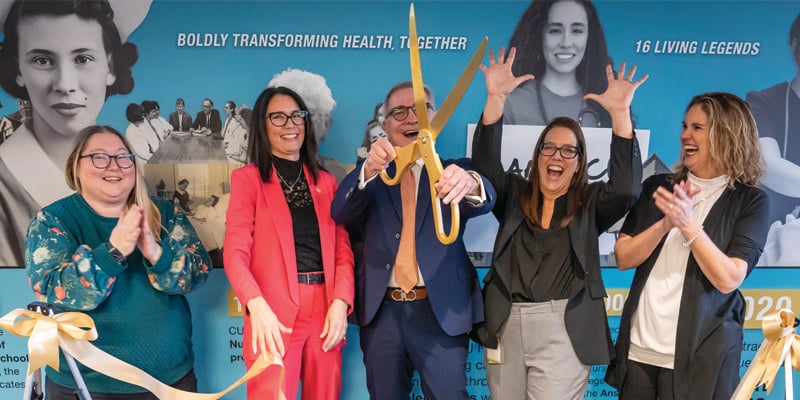Attending nursing school is exciting and rewarding. It can also be overwhelming, stressful, and demanding. How do you start to study? What is the best way to study? What will help you succeed? What type of learner are you?
Becca Vidal, a student in the Accelerated BS in Nursing (UCAN) program at the University of Colorado College of Nursing at Anschutz Medical Campus and a peer tutor, shared these tips to help you stay on track.
Figure Out How You Study
Everyone studies in different ways. You could be a visual learner, or some may be more auditory. You might notice you pick up on things easier if you have charts, photographs, or other visual aids. Or you could be someone who learns better by watching a video or listening to lecture clips. Finding the best way to learn is key to forming good study habits.
“I always ask my students what their learning style is,” Vidal says. “If they’re a visual learner, I’ll use visual components like graphics and charts to help them understand a concept. I had one student discover she was an auditory learner, so from that point forward I focused my tutoring on videos and things like that.”

CU Nursing students studying. |
Plan Who to Study With or Join a Study Group
Some students may want to study alone or with a group of friends. Think about who you want to study with.
Vidal splits their study time between their clinical group and studying alone. “Depending on what you’re studying, you may need to concentrate by yourself so you can avoid distractions. If I’m with my clinical group, we can stay on task. I have a friend in the UCAN program, and we know we can’t study together because we’ll talk the whole time.”
Consider a study group as a team. You’re all reaching for the same goal: to pass a class or understand a nursing concept. Focus on teamwork.
“In my group, if we're going over something and I think the answer is this but we find out the answer is that we talk about it,” they say. “We’re curious about each other and want to lift each other up. We take the time to dive in and ask ourselves, ‘How are we understanding this? What is the correct way to understand this?’”.
Vidal says study groups are helpful because everyone brings their expertise on different subjects. “My group has people who are knowledgeable in certain things,” they say. “I’ve learned so much from my group members.”
Pick a Good Place to Study
They might want to study in a coffee shop or library, while someone else might focus better on studying at home. Do you want a place with music or other noise, or do you want a quiet place?
“I feel most comfortable studying in coffee shops,” Vidal says. “Some people can only study in the library, while others can only study at home. Picking the right place to study matters because it helps you concentrate.”
Vidal says the best places on campus to study are study rooms in Ed2 North or South and the Strauss Health Sciences Library. “Study rooms have whiteboards – which are great to write stuff on. Those are my group’s go-to places to study.”
Ask For Help and Ask Questions!
CU Nursing offers peer tutoring, giving students an opportunity to learn from other students. The program is free for students in the college’s BS in Nursing programs.
“If someone fails their first test, I would say get a tutor,” Vidal says. “You’re not going to lose anything from seeing a tutor. It helps you, the student, but also helps the tutor reinforce their knowledge.”
Vidal says another sign a student might want to consider seeing a tutor is if their studying feels messy or chaotic. “If someone spent eight hours of studying and still failed a test, or if they feel lost – like if they don’t know how to take notes or aren’t registering the material, then I would consider seeing a tutor.”
Another reminder: consider reaching out to professors for help or stop by their office during office hours to ask questions.
Keep Things Simple and Have the Right Materials
Nursing and nursing-related topics can be complicated and confusing. Vidal says to keep things simple. Keep your notes organized and straightforward. Create charts, diagrams, or graphs to highlight key points.
“Don’t overcomplicate things if you don’t have to,” they say. “When I’m tutoring, I break things down in the simplest way, and students will tell me ‘Oh, I understand this now’.”
Vidal keeps their notes on an iPad but knows other students who use pen and paper to take notes.
“I went from writing and drawing on my paper notes to typing them up after I took a certain class because it felt right for me. I got my iPad specifically for CU Nursing because I knew it would help me, but I know every student is different.”
Having the right study materials also means being prepared: bring water (or something else to drink – Vidal says a lot of students rely on caffeine) and something to eat. Bring a laptop, charger, phone charger, and headphones (if you’re listening to music).
Be Efficient
“I’m really big on saving time and being efficient with time,” Vidal says. “It may not be beneficial to take notes from a 100-slide PowerPoint because that takes up a lot of time. Study the notes you take in class or create concept maps to help you understand a subject. I make my notes very visual and make three or four bullet points – which are the most important things I need to know.”
For some students, it might be beneficial to schedule blocks of time to study every week so you can stay on track. Breaking up study time into two or three-hour blocks can also help you focus. Consider making a to-do list of things you want to accomplish while you study.
Plan a Study Break
We all know studying for classes is important – but so is taking a study break. Research shows taking a break (even as short as 10 minutes) can help you re-focus, increase productivity, and keep you motivated. For shorter breaks, take a short walk around campus. Grab lunch or talk on the phone with a family member or friend during longer breaks.
CU Nursing offers additional academic support resources for students. Visit the college's academic support page for more information.



